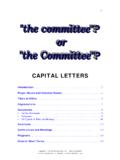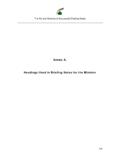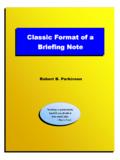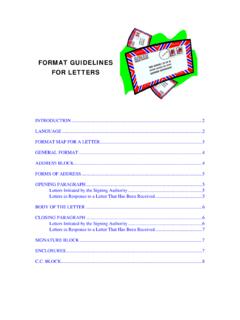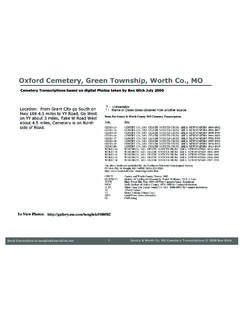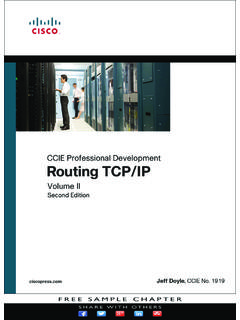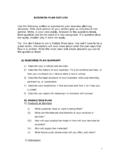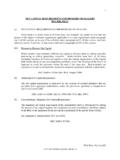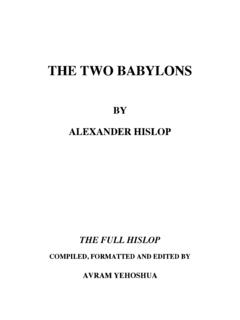Transcription of Abstract vs. Concrete - Writing for Results Inc.
1 Chapter II-2 Abstract more Abstract thetruth you wish to teach,the more you need toseduce the senses to NietzscheAbstract Selectthe Content Relevance Abstract Substance Fact Positive Yourselfa Frameof Reference Objective Audience Authority Barriers and Competition Time LinesSelecttheMedium Oral Written Both Oraland WrittenPreparetheMessage Organization Format Style Grammar Final TouchesSend the MessageAudienceResponsePerceptionWriting for ResultsA Step-by-Step Model for Successful BriefingsII-2-1 Copyright 1978-2006 Robert B. Parkinson All Rights Selectthe Content Relevance Abstract Substance Fact Positive 1978-2006 Robert B. Parkinson All Rights Nature of Benefits ..II-2-3 The Dangers ..II-2-4 Your or Specific?..II-2-7 Fact or Opinion? ..II-2-8 Comparisons ..II-2-8 Intensifiers ..II-2-9 Other Dimensions ..II-2-10 Length ..II-2-11 Comprehension Span.
2 II-2-11 1978-2006 Robert B. Parkinson All Rights canoe Abstract Concrete vs. THE NATURE OF LANGUAGEThe nature of language is Abstract . It uses symbols words to representreality. It is important to remember that those words are not reality itself. In thatfact lies both the great benefit and the great danger of with Abstract art, for some audiences you ll have to give detailed explanationsto get them to understand those word symbols the same way you do. Otheraudiences might see things your way already and know what you know, and youcan spare them the trouble of plowing through lengthy explanations. THE BENEFITSU sing word symbols opens up countless avenues ofcommunication that would otherwise be closed. Take,for example, the word canoe . Those black squiggleson paper are not actually a canoe. You can t paddlethem or carry them. And they have hardly any weight,so you can t even use them as a what a useful bunch of black squiggles!
3 Without them, you would have tocarry a canoe with you to make people understand what was on your mind everytime you wanted to refer to a canoe. And that s just canoes. What aboutII-2-4 Copyright 1978-2006 Robert B. Parkinson All Rights , houses, sunsets and highways? There s a limit to the number of thingswe can carry around with us. However, there s no limit to the number of words wecan have at our disposal. And we can deliver them around the world a lot fasterthan FedEx can deliver DANGERSA long with the benefits, there also come dangers. Because those black squigglesare not actually the canoe itself, they are imprecise. They can also be misleading,deliberately or word canoe doesn t give me any details about the canoe itself. How long isit? How old is it? Does it have holes in it? Who owns it? Who made it? What isit made of? When was it made? You might know these things about your canoe. But you can t expect me to know what you know about it unless you tell me.
4 Idon t know any of those details from the word canoe well, if you are Writing to someone who doesn t understand English, thoseblack squiggles don t conjure up the faintest image of a canoe. Even for those whodo speak English, the squiggles we use may be meaningless in some cases. Take chevrotain , for example. Unless you re a wildlife biologist, it is unlikely thatyou would know that chevrotain means any small deer-like animal of the familyTragulidae, native to Africa and Southeast Asia, having small tusks. If you needto use chevrotain , be prepared to explain what it means the first time you use it. Better still, provide a photo as same concept applies to many of the words we use on the job. For example,quite a few people in the energy industry are thoroughly familiar with the term hydrogen fuel cell . Others, however, might find the term as meaningful as A"84 !< 6J@D" .* If your audience is unfamiliar with a term such as hydrogen fuel cell , you ll have to explain it to them before you can expect toaccomplish anything by using the term.
5 * Greek for The Old Palace , the home of Greece s 1978-2006 Robert B. Parkinson All Rights JOBOnly you can decide when it s safe to use relatively Abstract terms and when youraudience will need Concrete details in order to understand things the way you do. The success or failure of your message depends heavily on those a writer, it is your job to add sufficient Concrete details about the words you useto serve your purpose and your audience s needs and also to be careful not toadd too many details that aren t really needed. Sounds simple in theory. Inpractice, it can be a formidable text in Figure on the next page provides a simple example. It s quite amouthful. And it uses a lot of precious space. Fortunately, if you are addressing aminister in the Canadian government, you could get away with this instead:The Cabinet Committee for the Economic Union will consider theproposal on Thursday, May 3, , for many people the relatively Abstract term Cabinet Committee for theEconomic Union is more useful than would be all the details without the abstractterm.
6 If, on the other hand, you decide that your reader needs to know who sits onthe committee, you could deal with it this way:The Cabinet Committee for the Economic Union will consider theproposal on Thursday, May 3, 2001. Attachment 1 lists the membersof the s another example:Widget 13-A is a bad I m responsible for evaluating widgets and my boss has confidence in myabilities, it may be sufficient for me to simply advise her that Widget 13-A is abad buy. On that information alone, she decides not to purchase one. Others, however, might not have the same confidence in my judgement. They will needmore persuading. For them, I might have to document Widget 13-A s safetyrecord, maintenance history, productivity, cost etc., and then compare it with otherbrands of widgets. In other words, I need to add Concrete details details that Iknow my readers care about in order to persuade them not to buy Widget 1978-2006 Robert B. Parkinson All Rights some cases, you will find that citing an Abstract concept and a single concreteexample will serve your purpose perfectly.
7 Chapter II-3, Substance vs. Froth, givesyou an excellent illustration of this. A LARGE COMMITTEEThe following will consider the proposal on Thursday, May 3, 2001:Sthe Honourable Ralph Goodale, Minister of Natural Resources;Sthe Honourable Arthur Eggleton, Minister of National Defence;Sthe Honourable John Manley, Minister of Foreign Affairs;Sthe Honourable David Collenette, Minister of Transport;Sthe Honourable David Anderson, Minister of the Environment;Sthe Honourable Sheila Copps, Minister of Canadian Heritage;Sthe Honourable Brian Tobin, Minister of Industry;Sthe Honourable Anne McLellan, Minister of Justice;Sthe Honourable Alfonso Gagliano, Minister of Public Works andGovernment Services;Sthe Honourable Martin Cauchon, Secretary of State (EconomicDevelopment Agency of Canada for the Regions of Quebec);Sthe Honourable Jane Stewart, Minister of Human Resources Development;Sthe Honourable Pierre Pettigrew, Minister for International Trade;Sthe Honourable Don Boudria, Leader of the Government in the House.
8 Sthe Honourable Lyle Vanclief, Minister of Agriculture;Sthe Honourable Herb Dhaliwal, Minister of Fisheries and Oceans;Sthe Honourable Ron Duhamel, Minister of Veterans Affairs and Secretary ofState (Western Economic Diversity) (la Francophonie);Sthe Honourable Claudette Bradshaw, Minister of Labour;Sthe Honourable Robert Thibault, Minister of State (Atlantic CanadaOpportunities Agency);Sthe Honourable Herb Gray, Deputy Prime Minister; Sthe Honourable Paul Martin, Minister of Finance; andSthe Honourable Lucienne Robillard, President of the Treasury 1978-2006 Robert B. Parkinson All Rights OR SPECIFIC?You often have the options of using either specific terms (relatively Concrete ) orgeneral terms (relatively Abstract ) without greatly affecting length, but certainlyaffecting impact on readers. You could say, for example, There are 550 animalson this farm. Or you could say, There are 550 cattle on this farm. As a rule,the specific has greater impact on readers than the general.
9 However, that rule canbe broken for any number of legitimate or nefarious that you often have a number of degrees of abstraction to choose from. Hereare examples, starting with the relatively Abstract and proceeding to the relativelyconcrete: means of transportation (could be an airplane, a motor vehicle, a train, a boat, abicycle or a space ship) boat (could be a submarine, a frigate, a freighter or a leisure craft) leisure craft (could be a speedboat, sailboat, a yacht, a canoe or a rowboat) canoe (could be made of aluminum, fibreglass or canvas and cedarstrip) canvas-and-cedarstrip canoe (could be any one of the many thousands of suchcanoes that have ever existed on earth) my canvas-and-cedarstrip canoe (could have any number of positive andnegative characteristics) my 16-foot red canvas-and-cedarstrip canoe, which is in good-as-new condition;here, I ll show you some photos of it (leaves relatively little to the imagination)Remember, however, that the nature of language is always Abstract .
10 You can userelatively Concrete words to reduce the possibility of misunderstanding, but allwords by their nature are Abstract . The word cow does not become concreteuntil you are down at the farm, looking at a specific cow in the barnyard. Interestingly enough, though, a sheet of words can tell you a great deal of usefulinformation about that cow in the barnyard that most people could not perceivesimply by looking at the cow in the barnyard. Words could tell you in secondshow old the cow is, who owns it, what it weighs, what it s worth on the market,whether it is purebred, what its state of health is, and any number of other usefulthings that might require several experts and extensive testing to determineotherwise. Such is the power of language. As a writer, your task is to decide when cow is sufficient, when you need to add details, and if so, what details to 1978-2006 Robert B. Parkinson All Rights OR OPINION?You often have the options of using either facts or opinions again withoutgreatly affecting length, but affecting impact on readers.
